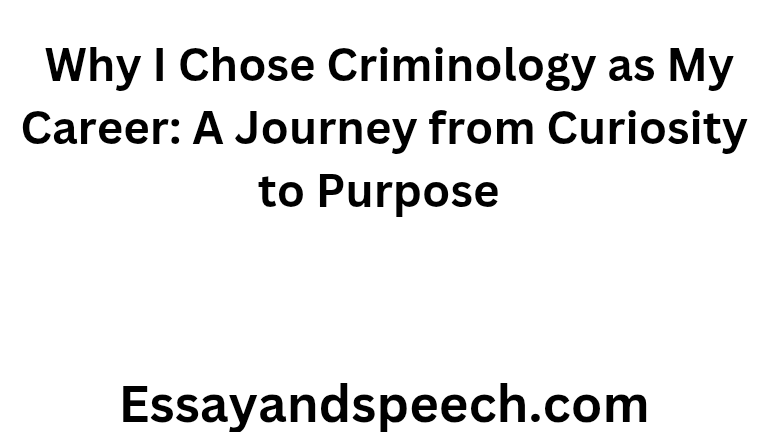The convicted felon can’t work for the FBI, you say? Well, it’s true: I’m no James Comey, but I could not have aspired to someone else’s career path anyway. Instead, my journey to criminology started with one simple question I couldn’t shake after watching a late-night documentary: “Why do people commit crimes?” That sense of curiosity snowballed into a desire to understand the “why” behind human behavior — and how society can cultivate justice. Here’s why I decided to go into criminology, and why it is not just a career but a calling.
The Spark: Real-Life Stories That Shaped My Perspective
When I was 15, a local news story captivated my town. One of the most respected teachers in town was arrested for stealing money from a charity he’d been heading for years. It was a bolt from the blue: How could someone so trusted have violated the law? This wasn’t just gossip — it was a master class in human complexity. I read up on the case, devouring articles about it, fascinated by the psychology behind his crimes. Was it greed? Pressure? A split-second decision?
At the same time, I discovered the work of the Innocence Project, a nonprofit organization that uses DNA evidence to exonerate the wrongfully convicted. Hearing stories of people like Calvin Johnson, who spent 16 years behind bars for a crime he did not commit, fueled a fire in me. It wasn’t just about catching “bad guys,” I learned, but also about defending the innocent and correcting a flawed system.
The Science of “Why”: Where Psychology Meets Justice
Criminology is a jigsaw of sociology, psychology, law, and even biology. Consider the example of Ted Kaczynski (the “Unabomber”). Was he the creation of his own isolated childhood? A paranoid mind? Or social vibes of the tech era? Criminologists, however, don’t merely pose these questions — they employ data, profiling and behavioral theories to figure out the answers.
At school, I found myself drawn to both subjects that delved into these intersections. A psychology class taughtme about Robert Merton’s Strain Theory and how the pressures of society can make people turn to crime when they can’t reach “success” with lawful avenues. A report on gang violence published by a sociology project showed how systemic issues — poverty, lack of education — feed cycles of crime. These lessons not only taught me things, they also made me want to figure things out, not just learn about them.
The Real-World Impact: More Than TV Dramas
Face it, shows like Criminal Minds make criminology seem sexy. But the real power of the field is its potential to effect change. For instance, restorative justice in schools, where offenders and victims meet to repair harm, have reduced repeat offenses by as much as 27% (according to a 2021 Cambridge study). And data-driven policing in cities such as Los Angeles has reduced violent crime significantly by targeting crime hotspots without simply overpolicing black communities.
I want to be a part of that. Perhaps I’ll focus on victim advocacy, making sure survivors’ voices are heard. Or maybe in policy reform, if you are trying to address biases in sentencing. From a courtroom to a classroom to a community center, criminology provides countless ways to make a meaningful impact.
The Future of Crime: Adapting to a Changing World
Cybercrime, human trafficking, eco-terrorism — the issues are changing, and so is the study of criminal behavior. I’d done an internship with a local cybersecurity company, and I had seen up close how hackers take advantage of weaknesses in systems (and human psychology!). It struck me: Criminologists need to be ahead of these trends — technically savvy and ethically insightful.
This adaptability excites me. I’m interested in emerging fields such as forensic linguistics (examining language in threats or scams) and environmental criminology (investigating how urban design affects the prevalence of crime). It’s not a career that is static — it’s a career of lifelong learning.
Why Criminology Chooses You
Here’s the reality: Not everyone is cut out for criminology. It requires empathy to apprehend victims, objectivity to dissect offenders and grit to stare down the darkness. But if you’re the sort of person who sits up at night reading about the capture of the Golden State Killer through DNA genealogy, or who argues about moral quandaries like “Should we punish or rehabilitate?” —this field might choose you.
To me, criminology falls in between curiosity and action. It’s a story about deploying science in pursuit of justice, raising hard questions and — maybe, one day — stopping the next wrongful conviction or cyberattack.
Conclusion
Choosing criminology isn’t simply choosing a profession — it’s choosing a cause. As criminologist Cesare Lombroso once stated: “The criminal is not a type of human, but a type apart from him.” It’s in understanding that “type” — and the society that made them — that we build a more just world. And really, what could be more rewarding than that?

